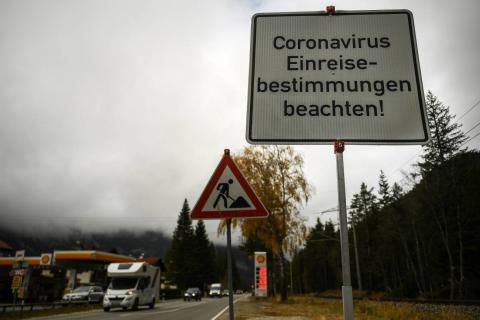Reactions to the new edition of the Social Perception Survey on Science and Technology
More than two thirds of Spanish citizens think that artificial intelligence presents a very high or high risk that we will be manipulated with our data by companies or governments. However, just over a third believe that artificial intelligence will have an impact on improving the quality of public services and companies. These are some of the results gathered in the 2022 edition of the Survey of Social Perception of Science and Technology published today by the Spanish Foundation for Science and Technology (FECYT), carried out among more than 6,000 people with face-to-face interviews in the 17 autonomous communities.

Adobe Stock.
Ana Muñoz - encuesta FECYT EN
Ana Muñoz van den Eynde
Head of the Science, Technology and Society Research Unit at CIEMAT
The presentation of the results of the 2022 edition of the FECYT Social Perception Survey is very good news, as it reflects the continuation of the series started in 2002. As far as I know, only the US General Social Survey maintains a similar periodicity. There are other surveys on the perception of science, such as the Eurobarometers at the European Union level, or the PAS (Public Attitudes to Science) in the United Kingdom, but they are not carried out on a regular basis. On the other hand, given the increasing difficulties in conducting surveys in face-to-face format, the fact that the sample includes more than 6,000 household interviews is highly positive.
There is so much information available that it is difficult to focus on any one aspect. Nevertheless, I believe that interest deserves some attention. It is a motivational construct that is always directed towards something (the object of interest) and reflects a desire to know more about it. It is one of the elements that is always included in surveys of the social perception of science. And the most common way to measure it is with the general question: to what extent are you interested in science? The results are always positive. In the 2022 edition, 47% of the sample say they are very or fairly interested in science and technology when asked directly about this question and 22% say they are not very or not at all interested. This is also an increasing and sustained trend since 2004. However, answering this question in the affirmative, once the topic comes to the forefront of the respondent's mind, is straightforward. And socially desirable. On the other hand, FECYT has long included a question to measure information interest. It is an open-ended question, in which no topic is specified beforehand and the option of mentioning three topics is given. 12.3% of respondents mentioned science and technology in one of the three options. In contrast to general interest, news interest grew in each of the editions until it reached a peak in 2018. From that year onwards, a decreasing trend can be observed. To put the general question data in context, we cannot ignore the indications that there is a low engagement with science and technology in the population. One of the reasons for not engaging in science and technology related activities, mentioned by 31.8%, is precisely lack of interest. There are also 13.4% who say that "It's not for me". On the other hand, 40 % say that they are not interested in getting involved in decision-making on scientific matters. 18.7% say they would like to get citizens involved, but do not want to do so personally.
In the literature on survey research it has been repeatedly found that the answers obtained depend very much on what questions are asked and how they are asked. Social perception surveys have a positive view of science in their questions, so they get a positive view of science in their responses. In the research we carry out at CIEMAT's Research Unit on Science, Technology and Society (UICTS), we have found a different picture. In 2019 we conducted a study in which we recruited participants through a Facebook advertising campaign that allowed us to identify a small but very consistent group of people with a very negative attitude towards science. We also saw, through the comments generated by the study, that people with negative attitudes went out of their way to make their views known.
In a study conducted in 2022, we found that the prevalence of a negative attitude towards science was low (around 3%), but we also found that more than half of the sample had a low positive attitude towards science, strongly influenced by a rejection of an instrumentalised view of science. We also found that the perception that science is an economic and political instrument negatively affects the perception of science as a source of knowledge. We hypothesise that this result is due, at least in part, to the public discourse on science, in which two opposing but equally counterproductive frames of reference predominate: one centred on science as a source of growth and economic progress (instrumental vision) and the other centred on the legend that it is infallible. The former translates into the image that science is manipulated. The second generates unrealistic expectations, which can damage the image of science when they cannot be fulfilled. At the same time, little space is devoted to talking about the nature of science, what its processes are. As a result, phrases such as "Science is wrong" or "Science's answers are provisional", which we designed to reflect a view of science as a source of knowledge, actually act as negative attitude indicators.
In this context, it is interesting to note that 60.5% of respondents to the FECYT survey consider the scientific information they receive to be superficial and 76.7% consider it to be insufficient. This figure is somewhat contradictory if we think again about the people who say that they are interested in science information. This is an issue that needs to be studied in more detail, as well as trying to identify what lies behind the answers to the general question on interest in science. In the analyses we have carried out at UICTS, we have found that it has no explanatory power, i.e. we do not know what people are thinking about when they answer. Probably very different things.
Conflict of interest: "I have been part of the Expert Group designing the FECYT Survey questionnaire for the 2014, 2016 and 2018 editions. I have participated in FECYT publications with detailed analyses of the FECYT Survey data in the 2008 to 2016 editions. I have received funding from FECYT in the 2013 and 2020 editions of the "Convocatoria de Ayudas para el Fomento de la Cultura Científica, Tecnológica y de la Innovación de FECYT".
Igor Sádaba - encuesta FECYT EN
Igor Sádaba Rodríguez
Lecturer of the Department of Sociology: Methodology and Theory at the Complutense University of Madrid
This is a well-founded study developed by a group of experts in the field. The survey is excellent in terms of sample size, methodological rigour and contributions. Working with large samples (more than 6,000 people) in Spain, with a well-constructed design and a low statistical error (+- 1.29%) is unusual except for a few institutions (CIS and INE) or large opinion polling companies. However, we know that any survey, insofar as it works with samples (representative subpopulations), has this margin of error which, although small, is inevitable and is never zero. Therefore, data and estimates must be read with this in mind. On the other hand, there is also a possible bias generated not so much by a bad methodological design as by the moment we are living in, where scientific issues sometimes generate positions that are too polarised, maximalist or intense. In the aftermath of the pandemic, many positions on scientific issues (climate change, for example) have become somewhat extremist or emotional and politicised. This effect is present in all current public opinion surveys.
There are many data or results worth commenting on from the Survey of Social Perceptions of Science and Technology 2022. From my point of view, and in a very personal way, I am struck by the fact that science does not arouse much interest (11th place) and the huge number of people who say that they do not spend more time on science and technology issues due to lack of time (54%) or lack of knowledge (33%) or interest (32%). The barriers to approaching the scientific universe are varied, but we usually end up delegating its study to experts and it makes it easier for us to say that we have other things to do or that, as laymen, we lack sufficient skills. Science ends up being paradoxical because it is recognised as vital (2/3 perceive its benefits) but is not attended to personally; it is usually something that is considered essential but delegable.
I am also very surprised that the Spanish population's level of scientific literacy and knowledge is somewhere in between, not to mention average. In other words, there are still many subjects in which Spaniards do not know how to respond adequately to basic science questions. The causes of climate change and the usefulness of antibiotics seem to be the subjects on which the Spanish population is most ignorant or has the poorest aim. And these are two topical issues that leave almost one in four Spaniards without knowledge or without the capacity to respond adequately. Training in science and technology to improve this type of test is a pending issue.
Finally, there is a rather striking fact. When the sample was asked about the means of scientific information, social networks fell for the first time in the historical series as a source of such information. In other words, for the first time in many years, social networks do not increase their presence when the population searches for scientific data on them. It is not clear to me whether this is due to some sort of cap or ceiling on the growth of the networks or an attempt to avoid sources of dubious scientific information. Social networks are on the decline, leaving their place to "videos" (YouTube or similar) whose veracity and accuracy is not always the best or correct. Visual channels (new digital televisions) now seem to be the main source of scientific information for the Spanish population, an unfiltered and unregulated channel where very heterodox and sometimes conspiratorial views abound.
This work shows, as reflected in the most cutting-edge and solvent international studies, that science continues to be one of the basic pillars of social life today. It is a genuine collective institution, valued and trusted, central to the development of our contemporary societies. At the same time, however, it serves to detect that, mainly in the wake of covid-19, a number of feelings of mistrust and unease about scientific practice have arisen and emerged. This shadow of suspicion, which has always existed, is greater than ever today, not so much because of shortcomings in the scientific profession, but certainly because of overstated expectations, poor scientific communication, and a galaxy of exorbitant hoaxes and fakes that are circulating in digital networks and audiovisual repositories on the Internet. In fact, although doctors come out well in the rating part (70% highly rated), scientists in a general sense do not (47% highly rated), almost 20 percentage points below.
It has no major limitations because it is a well-designed, well-conducted and well-finished study. In fact, by following a historical series of several years of biannual surveys, it makes it possible to compare the evolution and dynamics over time, which is perhaps the most relevant aspect. What is worth noting is that we may still be in the aftermath of the Covid-19 hangover. The effect of the pandemic has been an excessive shock, which generates a kind of daze and post-traumatic stress that leaves traces in these studies. Surely there is some effect of the timing on certain outcomes where there are still many people with covid-19 in recent memory (permanent mental covid). To what extent this may condition or bias some answers we will not know until we see how the data evolves over the next few years. But it is true that we are living in a post-pandemic moment beset by war, climate change and economic crisis, and all this has an influence.
Conflict of interest: in the past he was involved in the analysis of one edition of the survey.
Carolina Moreno - encuesta FECYT EN
Carolina Moreno-Castro
Professor of Journalism and POLIBIENESTAR researcher at the University of Valencia
FECYT's Survey of Social Perception of Science and Technology (EPSCYT) 2022 is an instrument of great social value that allows academics and institutional managers to check, every two years, the patterns and trends that occur in the Spanish population's social perception of science and technology. These results are undoubtedly a jewel for social researchers, as well as an excellent barometer to analyse whether some public policies related to science and technology are permeating Spanish society, whether there is resistance to them or whether there is a lack of knowledge, as could be the case with current issues such as the vaccine against covid-19, artificial intelligence or big data. Over the years, the survey has adapted to new realities, both in terms of diversity, becoming an inclusive sample of the Spanish reality, and in the design of the questionnaire, which is always open to incorporate new questions, depending on the social drift, adapting to the new thematic challenges of the digital and pandemic era.
In my opinion, it was a good idea to include in EPSCYT 2022 the different reasons why people vaccinated against covid-19 could not have a booster dose ("it is not appropriate", "it is no longer so serious", "because of the effect of the previous dose", "because of health risks", "because they believe they have a low risk of infection", "because they believe it is not effective", "because of fear/distrust", etc.) and there would probably have been even more reasons for not having a booster dose. ) and there would probably have been even more surprising responses if the question had been open-ended, leaving each participant to answer spontaneously; although I am aware of the complexity involved in regrouping the responses for analysis. Nevertheless, I highlight this question because the responses of the people interviewed situate the attitude and perception of citizens in the face of a novel event in which it is not enough just to know why there is a decision to oppose a public health action, but also to know the reasons for each person, in order to find similar patterns that will start from different meanings but which will finally reach a common point of attitude, which would be not to take a booster dose.
In relation to the volume of data produced by the survey, one of the data that continues to attract my attention today is that related to the scientific career of research staff in universities and public bodies. The people interviewed continue to rate their scientific careers as "Poorly paid" (61.7%), "Poor social recognition" (62.7%) and "No job stability" (61.8%). Knowing these data continues to cause me great unease because in the research teams we have incorporated people who are in training programmes to carry out their doctoral theses and are usually quite demotivated, as they do not easily see their professional prospects on the horizon. The data corroborate that this perception is shared by those interviewed outside the world of research.
Finally, I did miss the inclusion of a question on misinformation in EPSCYT 2022, as measuring the perception of the discourse of science versus individual interest yields extremely interesting data and shows an objective reality: the lack of information on most topics related to science, health, environment, technology, among others. Thus, it would also be interesting, when talking about the media, networks and platforms through which the interviewees inform themselves about science, to have introduced some questions about misinformation, which would have been of great interest, given the size of the sample. In any case, we are very grateful, both to the FECYT and to the entire technical team of the survey, for continuing with the commitment to provide these data, which are constituting a historical series in Spain and are of essential value for many social science research projects.
Conflict of interest: although the author has not participated in this survey in any of its phases, she declares a conflict of interest with the FECYT as she is a member of the Foundation's Advisory Council and has participated in other surveys and in the preparation of other reports, through contracts for the transfer of knowledge to society.
FECYT
- Survey



